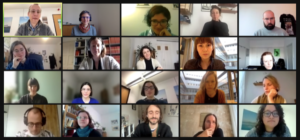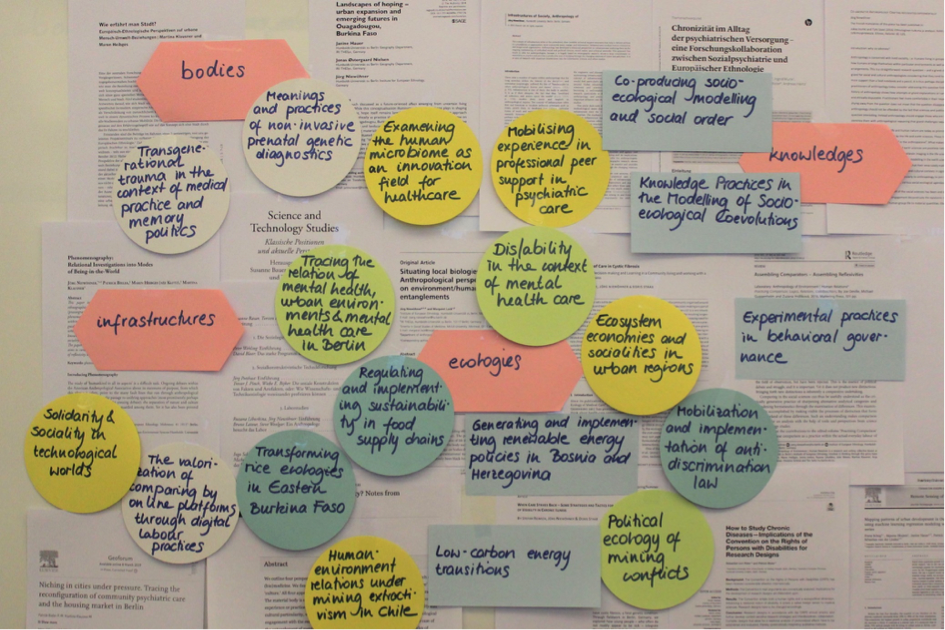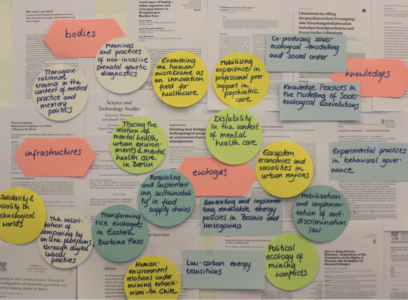This page is still under construction – or discussion, rather. The following text is an excerpt from our publication on our current work in the EASST Review, to be found here.
Our members’ research falls, broadly speaking, into two fields: life sciences, medicine, medical technologies and psychiatry on the one hand – and on the other sustainability, global land use, the role of modelling in human-environment systems and political ecology. Despite the broad range of topics we tackle in around 20 individual Master, PhD and Postdoc projects – ranging from the interconnections between (shifting knowledge about) medical care and urban environments, digitalization and memory politics and the subsequent changes in work systems/ecologies & governance to transformations of food and energy systems as well as resource socialities more broadly and finally, knowledge produced about such phenomena for example by socio-ecological modelling groups – and the geographical distribution of field-sites across Europe, the US, South America and West Africa we are committed to the idea of research as a collective endeavor. This is then our first point to make:
The Laboratory: Anthropology of Environment | Human Relations is more-than-project. Our self-understanding is more akin to what Ludwik Fleck has termed a thought collective:
“Although the thought collective consists of individuals, it is not simply the aggregate sum of them. […] A thought collective exists wherever two or more people are actually exchanging thoughts. He is a poor observer who does not notice that a stimulating conversation between two persons soon creates a condition in which each utters thoughts he would not have been able to produce either by himself or in different company. A special mood arises, which would not otherwise affect either partner of the conversation but almost always returns whenever these persons meet again.” (Fleck 1979 [1935], 41-44)
We are dedicated to providing and generating space in which ideas that are not quite finished yet, as well as research-in-the-making, can be openly discussed. Yet, our thought collective exceeds Fleck’s in that it is explicitly open for and actively seeking disconcertment. We seek to constantly oppose our own problematizations, approaches and findings, thereby seeking to expose their underlying assumptions and understandings to critique from within our collective as well as from the outside by welcoming guest researchers and discussing their works and comments to avoid becoming too comfortable. The lab is not a filter bubble.
Our commitment to work that is ‘more-than-project’ comes in different modes. Through constant reporting from our individual projects around our weekly meetings we establish contact points between projects, thereby fostering ideas, which exceed the individual members’ projects and can then be taken to broader discussions in STS, anthropology and the respective disciplines that define the fields we study. […]
Moreover, we cherish concept work on a more daily basis, making it less ‘quantifiable’ but not less productive. In our weekly sessions, we attempt to link conceptual discussions that emerge in one field to other fields as well as to overarching questions in STS and anthropology: comparison, juxtaposition, diffraction. […] Paralleling our attempts to think through rather than within projects, we have ongoing discussions about how to empirically trace and conceptually frame relatedness, a question that connects many of our ongoing projects, whether they deal with supply chains, mental health care in urban space or the emerging rice market in Burkina Faso. Exchanging concepts from different fields, switching lenses and thought traditions and exploring what they might add to our own thinking is an inspiring exercise that helps us to strengthen our arguments and positions. […]
The lab pushes ethnographic inquiry and theorizing to be more-than-deconstruction. All lab researchers share the belief that our research needs to amount to more than critically deconstructing any sort of phenomenon or prevalent problematizations on and of the fields we research. We, therefore, aim at co-laborative and response-able research designs and at keeping the possibility open for situated interventions, feedback loops and generative critique. […]
Although our fields as well as modes of research differ considerably in how they allow for different degrees of co-laboration, we share a commitment to ethnographic research and theorizing not only of but also in, with and for the world as the ultimate vantage point.
So, as you can tell from this text, we are not only more-than-human, but super-human, really: critical and generative, engaged and reflexive, versed in disciplines but also transcending them. Above all, of course, we are more-than-serious, so get in touch and join our sessions.
We are currently meeting in a hybrid format with some members of the lab gathering in person and others and guests joining via Zoom.


